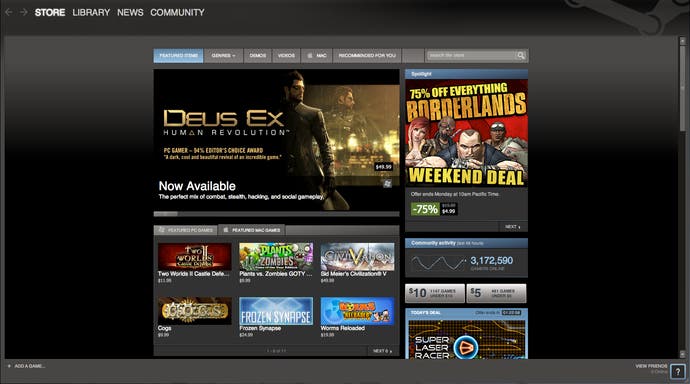Steam vs. Origin: Is Competition Good for Gamers?
EA, GOG, Gamersgate, Gabe Newell weigh in.
From its humble roots as a conduit for Counter-Strike back in 2003 to its current status as a digital delivery juggernaut with over 30 million subscribers, Steam's rise has been little short of remarkable. With an estimated 70 per cent share of the entire PC market, Valve's store has transformed a small developer into one of the games industry's most powerful players.
However, while serious challenges to its dominance have been few and far between in recent years, the playing field suddenly seems to be getting a little more crowded. EA's decision to launch its Origin store back in June presents the biggest threat to Steam's dominance yet, especially if it sets a precedent that other publishers will follow.
But has Steam built an unassailable lead? Is EA shooting itself in the foot? Or does the impending digital revolution spell the end for its good will-driven market monopoly? Eurogamer spoke to a number of key players in the PC download market, Valve and EA included, to find out.
First things first, the Steam faithful may well argue that there's no need for an alternative. Steam's brilliant, right? Accessible, developer-friendly, passionate about its content and offering good value for money, it's the fat cat it's okay to like. Certainly, you'll have trouble finding anyone willing to argue that it doesn't deserve its success, whether they be a developer, commentator or competitor.
"Steam's secret weapon is that the people at Valve just seem to understand games and their audience on a level far beyond that of most large companies, and this is evidenced in which games get promoted on the service and the overall feel of the experience," neatly surmises Supergiant Games' Grag Kasavin, whose delightful action RPG Bastion recently launched on the service.
"In spite of Steam's size, it feels more like buying games from a hobby shop than from a strip mall. I think this comes from Valve taking the long view of the business, and placing customer satisfaction as a high priority."
"The reason it has won is that it has delivered a service that everyone wants and that everyone likes," adds Nicholas Lovell, director of consultancy outfit GAMESbrief. "It just works. It makes life really easy."
But however good it is at what it does, healthy competition is vital. Not only because it drives innovation, keeps prices down and helps grow the PC market, but also because a Steam-only future might not be the level-headed utopia we'd all like to imagine.

"Any monopoly is dangerous," insists Lovell. "It's all well and good we think Steam are the good guys today, but Google used to be the good guys. They used to be the upstarts, and now we're all a bit afraid of them. The good guys, once they get into power, can become the not-so-good guys.
"Any time somebody can stifle what comes to market by their choices, it's an issue. If - and I'm not saying this is happening yet - Steam goes, 'I don't like your game', then it can just stop an indie from getting their game into a meaningful marketplace.
"At one level, they've got an infinite shelf space and they can stock as many things as they like, but at another level there's only a limited number of sales, there's only a limited number of front pages, there's only a limited number of business development people willing to sign the contract," he continues.
"They can just say 'we don't want to do that'. They start being able to censor what they distribute. When one person can effectively say yes or no over whether a product gets shipped, that's a dangerous place."
So, what are the chinks in Steam's armour? Where should the competition be focusing its efforts? The consensus seems to be that anyone wanting a shot at the title is in for a monumental struggle. Valve's store has a huge, contented customer base that will prove very hard to shift.
"Steam is dominant because they were early, executed well, and keep improving the service, with very high customer satisfaction," explains Wedbush Morgan analyst Michael Pachter.
"It will be difficult for anyone to topple them. The analogy is Bing to Google search. It doesn't really matter how good the competitor is if switching costs exist, as most people who are perfectly satisfied won't bother to check out the competition."








